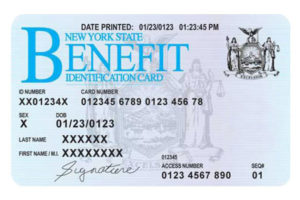Republican Work-for-Food-Stamps Plan Could Force 750,000 Americans Out of the Anti-Poverty Program
The federal Department of Agriculture program pushed by the White House to require food stamp recipients to work likely will affect nearly 50,000 New York City residents—and more than 750,000 nationwide, according to a new study by the Mayor’s office in New York.
What passed last year as part of the big farm bill package included a provision that food stamp recipients—a program administered by the Agriculture Department—must be working, in a job training program or actively looking for work if able-bodied individuals without dependent children.
It’s worth looking at the distance between what looks good in Washington and what looks not-so-good on the ground.
Nearly 50,000 New York City residents would lose a monthly average of $151 in Supplemental Nutrition Assistance Program benefits.
Those Able-Bodied Adults Without Dependents or “ABAWDs” aged 18 to 49, are limited to three months of food stamp benefits over three years unless they work, volunteer or get job training at least 80 hours a month. As it stands, states can grant individual exemptions or waive time limits in areas of high unemployment or lack of sufficient job openings.
Trump defines those waivers as possible in areas where unemployment tops 7% over a 24-month period. New York City’s unemployment rate is 4.2%. New York State waivers include the Bronx, parts of Queens and Upper Manhattan.
All in, the rules could cost New York City almost $100 million a year in lost benefits, resulting in more than $150 million annually in lost business, say city officials. In formal comments opposing the plan, the Office of the Mayor told federal officials nearly 50,000 city residents would lose a monthly average of $151 in Supplemental Nutrition Assistance Program (SNAP) benefits.
Those food stamps normally are spent at 9,400 New York City supermarkets, bodegas, farmers markets and other retailers which could lose revenue and, therefore, jobs.
Outside the City, 33 New York counties, five cities and a town, also have waivers. New York State would lose 89% of its current waivers, newly subjecting 107,000 SNAP beneficiaries to time limits, according to Hunger Solutions New York.
The City Limits newsletter quotes Nicholas Freudenberg, director of the City University of New York’s Urban Food Policy Institute as saying, “We may be saving a few bucks by not paying them SNAP, but we’re generating costs that will eventually end up as public costs for taking care of people.”
The USDA estimates it will save the federal government a projected $15 billion over a decade.

Some 40% of the city’s ABAWD population is black and 28% is Latino, according to the mayor’s office. While the city’s overall ABAWD unemployment rate was 6.4 % in 2017, it was 10.8% for Blacks and 7.9% for Latinos. In January, 28.6% had no permanent address, and 4.4% were living in shelters.
City Hall hasn’t always advocated expanding SNAP benefits. Mayors Rudy Giuliani and Mike Bloomberg did not allow waivers.
A Mathematica Policy Research study of the 1.2 million ABAWDs who would be newly subject to time-limits, found 97% live in poverty compared to 80% of others on SNAP. Eleven percent were working, although less than an average of 20 hours a week.
The reactions offer an interesting depiction of translating policy to people:
- “If this was really about the dignity of work and efficiency of the program, we would wait to see the final results from the 2014 Farm Bill, which provided $200 million for 10 employment and training pilot projects,” said Rep. Marcia Fudge (D-Ohio).
- “Limiting ABAWD waivers—especially without adding a penny for job creation or wage hikes—would increase hunger and fail to increase employment,” says Joel Berg, CEO of the NYC-based Hunger Free America. Instead, the proposal should include a “serious job program, with serious job training, with work subsidies to help small employers hire more people, [and] expansion of the earned income tax credit.”
- The administration’s proposal does not address “the problem of people going hungry or needing assistance. It’s just going to shift that burden downstream, whether to the state, to the city, to the charities in the New York region and to hungry people themselves,” says FRAC’s Ellen Vollinger.
Clearly, this is how we make America Great Again. Imagine how this group could improve health care.
Featured image: The Rush Limbaugh Show.





